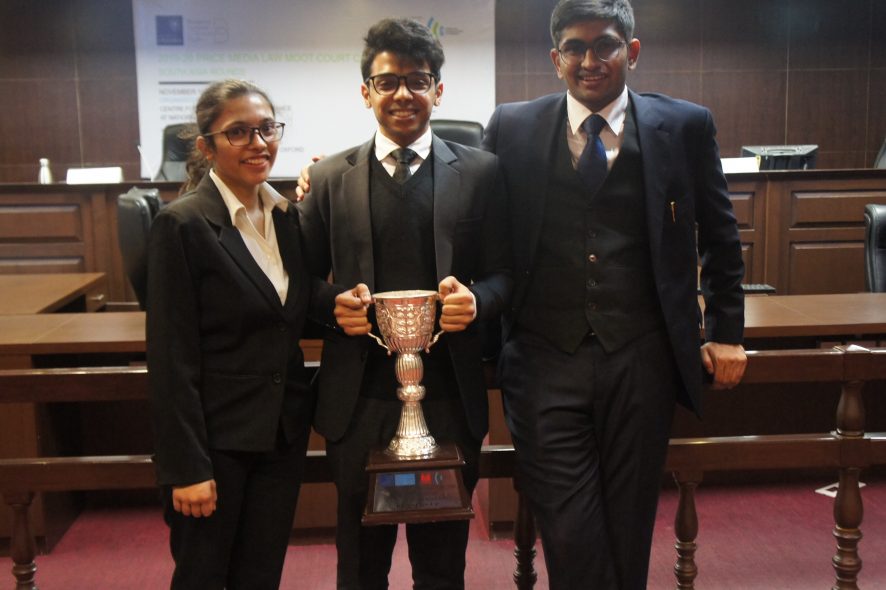Atharva and Isha are third year students at National Law University Delhi. They were part of the team which made it to the finals of South Asia Regional Rounds of National Law University Delhi. However, this is not the first time the duo has performed exceptionally well in a mooting competition. They were part of the team that broke third in the prelims of the prestigious Willem C. Vis International Commercial Arbitration Moot (East), and also made it to its octa-finals. They were being interviewed by EBC/SCC Student Ambassador Shruti Srivastava.
- This is not the first time the two of you have participated in the moot. If you could share your mooting history in college, emphasizing on why out of all extra-curricular activities, you both have consistently decided to pursue mooting.
Isha– We both had participated in Tankha Moot organised at NLIU in our first year, followed by Vis (East) in our second year and now in the Price Media Moot. Personally, I have participated in mooting activities because of the thrill associated with it. It is also a great learning experience. As I had never participated in oratory activities in school, I thought of giving mooting a try in law school.
Atharva– For me personally, I opted mooting because I always saw it to be a comprehensive law school activity. Mooting involves researching, drafting as well as presenting those arguments in oral rounds, thereby honing all three essential components of pure advocacy, thus for these reasons I thought mooting would be the perfect activity for me to take up in law school.
- After doing the first two arbitration moots, what made you choose a courtroom moot? How are arbitration moots, in general, different from courtroom moots?
Isha– After doing two moots in the area of International Commercial Arbitration I thought about trying other areas of law as well. In this regard, Price Media Moot interested us because of its connect with the recent happenings in the area of privacy and freedom of speech and expression. Given that we are in the third year, the timeline of the Moot was also in line with our college schedule.
Atharva– I feel arbitration and courtroom moots both do require up to some level a different skill set, not only for drafting the memos but also for the oral rounds. Primarily arbitration moots are more fact heavy and the use of legal authority to convey one’s point is limited, as the issues more often than not are driven by the problems that parties face through their transaction. However courtroom moots are more legal authority and legal proposition based and therefore require more legal than critical thinking. This difference can be observed in oral pleadings where courtroom moots have heavy reliance on case laws while arbitration moots are appeal more to logic and commercial realities.
- In what ways, do you believe that mooting has contributed or will contribute in your (academic) careers?
Isha– Participating in moots helped us in understanding the different areas of law which are usually not part of the academic curriculum. The in depth research required while preparing a memorial enables you to decipher if a particular area of law interests you. The important soft skill that people learn from such activities is team work which is surely going to be a help in their academic careers.
Atharva– Certainly, participating in moots helps one better understand the practical application of any law. Additionally because drafting and research are so integral to the legal profession, moots provide a perfect avenue for a law student to start early and improve on these essential skills.
- For law students, especially freshers, who intend to moot in the future, what would your advice be?
An important advice for freshers is to give the mooting activity a try for sure to know if they like it. They should not get bogged down by the fact that during their schooling years they did not participate in any such activities.
Isha– With respect to mooting, I think the freshers should strive for strong research and logical coherency. Simple and easy language will enable the readers of your memorials as well as the listeners of your pleadings to understand your arguments.
Atharva– My advice would be to anybody starting with mooting would be following
- Find yourself a team that you are comfortable to work with, it is essential that you are comfortable with the team you are mooting with because, mooting essentially is a team activity, there is no individual glory in the moots.
- Read extensively and read from as many sources as possible, do not stop until you are absolutely sure on the point of law.
- Draft your memo in the most simple manner, your memo should be such that a person who does not know anything about the law should be able to understand and comprehend what has been written.
- Lastly, mooting is supposed to be a fun activity, so ensure that you enjoy the process.
Both Isha and Atharva shrugged at the question enquiring about their plans after graduating law school. But given their performance at everything they dip their toes in, their future sure seems promising.







